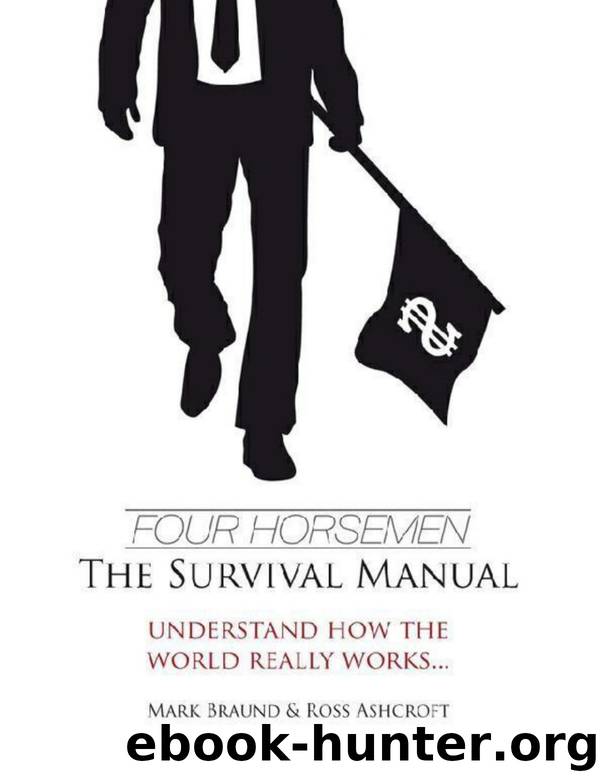Four Horsemen: The Survival Manual by Mark Braund

Author:Mark Braund [Braund, Mark]
Format: epub, mobi
Published: 0101-01-01T00:00:00+00:00
There is a further form of rent seeking, driven by more established methods, that has recently become rampant and which negatively impacts the labour market. If, with the proceeds of their rent-seeking activities, top executives of banks and financial institutions pay themselves huge salaries and bonuses, the labour market dictates that senior execs in firms that do create real wealth should be similarly rewarded. This skews the market mechanism because it doesn't distinguish between the CEO of a rent-seeking investment bank and the CEO of a wealth-creating firm: both end up earning inflated salaries. In order to justify these, they have to keep their shareholders happy. They do this by rewarding them with higher dividends. As a result, a disproportionate share of revenue is taken by shareholders at the expense of wages. Within the distribution of wages, a similarly disproportionate share goes to senior executives at the expense of the rest of the workforce. This doesn't reflect any change in the contributions of capital and labour, or within the relative contributions of different sections of the workforce; it is a direct result of the impact of rent-seeking behaviour on the labour market. It explains the massive increase in the pay multiples earned by senior executives compared with other employees over the last three decades.
The Greek philosopher Plato said the ratio of earnings between the highest and lowest paid in any organization should be no more than six to one. In 1923, banker J.P. Morgan declared that twenty to one was optimum. Today the earnings ratio between the highest and lowest paid in large corporations can be as much as a thousand to one. Herman Daly has a clear insight into the problems this causes: “when you are up in the range of five hundred to one inequality, the rich and the poor become almost different species, no longer members of the same community. Commonality of interest is lost and so it's difficult to form community and to have good, friendly relationships across class differences that are that large.”
And it gets worse. By shifting incomes from people who would spend most of what they earn on things they need, to people who already have everything they could possibly want, the prospects for future wealth creation are further damaged. The over-paid use their additional wealth to drive up the prices of non-productive assets like land and housing, expensive jewellery and fine art.
Looted rent spoils are exchanged for things that represent real wealth. Even the best wines in the world are no longer available to be enjoyed by wine lovers, because they're appropriated as investment assets. Claret and Burgundy chips are now traded in all the best financial casinos.
There can be no doubt that the economy as currently arranged promotes a totally unfair distribution of wealth. Bankers, speculators and landowners engage in activities that extract wealth created by others. In companies that do create real wealth, the factors of production are rewarded unjustly. The rich are getting richer at the expense of those who do most of the work.
Download
Four Horsemen: The Survival Manual by Mark Braund.mobi
This site does not store any files on its server. We only index and link to content provided by other sites. Please contact the content providers to delete copyright contents if any and email us, we'll remove relevant links or contents immediately.
| Anthropology | Archaeology |
| Philosophy | Politics & Government |
| Social Sciences | Sociology |
| Women's Studies |
Cecilia; Or, Memoirs of an Heiress — Volume 1 by Fanny Burney(32533)
Cecilia; Or, Memoirs of an Heiress — Volume 2 by Fanny Burney(31933)
Cecilia; Or, Memoirs of an Heiress — Volume 3 by Fanny Burney(31923)
The Great Music City by Andrea Baker(31907)
We're Going to Need More Wine by Gabrielle Union(19028)
All the Missing Girls by Megan Miranda(15915)
Pimp by Iceberg Slim(14475)
Bombshells: Glamour Girls of a Lifetime by Sullivan Steve(14045)
For the Love of Europe by Rick Steves(13844)
Talking to Strangers by Malcolm Gladwell(13338)
Norse Mythology by Gaiman Neil(13331)
Fifty Shades Freed by E L James(13224)
Mindhunter: Inside the FBI's Elite Serial Crime Unit by John E. Douglas & Mark Olshaker(9308)
Crazy Rich Asians by Kevin Kwan(9268)
The Lost Art of Listening by Michael P. Nichols(7485)
Enlightenment Now: The Case for Reason, Science, Humanism, and Progress by Steven Pinker(7303)
The Four Agreements by Don Miguel Ruiz(6735)
Bad Blood by John Carreyrou(6607)
Weapons of Math Destruction by Cathy O'Neil(6254)
